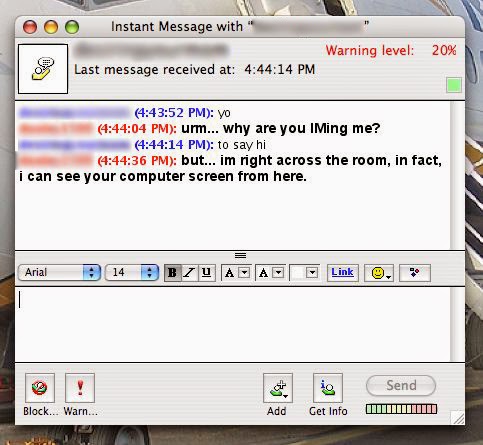Social Networking = Social Awkwardness
In addition to learning our ABCs, how to tie our shoes, and how to count, our pre-school and early elementary years are about learning how to socialize with our peers. We step outside of our parents' supervision to step into the world of sharing toys and attention with kids other than our siblings. While there were some tribulations with not being invited to the popular girl's birthday party and dealing with the boy who tormented us on the playground, we managed to grasp the concept of socializing pretty well by age 10. But as our elementary years went by, something unprecedented happened: our socialization took to the internet.
I remember my first AIM screen name: nagemqt12. I created it with my name backwards, qt because I was a cutie (obvs) and 12, the age I was at the time I created it. Not the most sophisticated of formulas, but hey, I was 12. I loved the freedom that talking online allowed me. I could be bolder, more expressive, and say the things I was too nervous to say in person. It was especially helpful in those early boy/girl conversations of middle school. How else could I be expected to talk to my "boyfriend" of the week? And from that very first AIM screen name and A/S/L question asked to a stranger, we were hooked to communicating online.
We are the first generation who grew up always having the internet. No wonder it comes so naturally to us. Hand a kid an iPhone and he instinctively knows how to play a game quicker than we do. We didn't have to take special classes to learn how to use Microsoft Office from the dingy community college, it was integrated into our schools from the elementary age on. While older generations have adapted to instant messaging, our generation didn't have to adapt. This communication came as naturally to us as tying our shoes. Right when we were ready (and allowed to by our parents), this technology became prevalent. And so we adapted to each new method as it arrived: Xanga, MySpace, Facebook, Facebook Messenger, SnapChat, Tender and so on.
Yes, we can boast that we're up to the latest trend and how many "friends" we talk to on a daily basis, but how many conversations to we sacrifice with in real life friends or potential friends for this feat? If we weren't busy texting/tweeting/scrolling through our news feeds, how many people would have talked to us? But now that the cycle has started it can't be ended. When I go to yoga class I try to place my mat next to an approachable person I could see myself being friends with, but of course I end up sitting next to someone who is either stretching for the entire ten minutes before class or busy on their phone. In another generation, we would make some small talk, find a common interest, and develop a relationship over several classes before making plans to meet outside of class.
Dustin makes fun of me because I hate talking on the phone. I pester him until he makes my doctor's appointment or calls a store to see if they have the dress I want in stock. But in all honesty, it really isn't funny. It's a social ineptitude that much of my generation possesses. We'd much rather spend the extra time to get a customer service question answered online than call the person themselves. Part of this is because of our tendency to multi-task. We're never doing JUST one thing. Right now, I have 12 tabs open and I've switched from Facebook, to Instagram, to Gmail, to LinkedIn approximately 67 times since starting this blog. If we talked on the phone we have devote our full attention to one task, which feels almost painful.
Unless we attend a networking event where we're forced to step out of our comfort zone and talk to complete strangers like I've attended recently, we are completely lost when it comes to talking to strangers. What if they don't want to talk to me? What if they're busy? And most importantly, What will I say? How can a generation who's so used to making small talk online and finding ways to stretch an email/instant message conversation last hours, be so inept when it comes to making conversation in person. The only way we know how to talk to strangers falls into the drunk pick up line varieties. Take away the booze and the initial attraction, we're totally lost on how to approach a stranger.
Our lack of in real life socialization doesn't end with strangers either. After the initial catching up and covering the usual topics with friends, we turn to our phones as a crutch when the conversation lags. We can't stand to have an awkward lull in the conversation. Instead we look down at our phones, hoping something interesting pops up that we can bring into the conversation. But if we didn't have this crutch to fall back on, would we be more creative on what we talked about with our friends and family? Would we be more open with each other and share more?
I guess we'll never know the answer to these questions because communicating online is so ingrained in us and we're so scared that we'll miss out on something online. But what we can do is to try to incorporate some of our online conversation tactics into our real life ones. What were your go to get to know you questions? You know what you asked to those chat room strangers and those questions in the first few weeks of dating someone new: What's the best movie you've seen lately? What is the first thing you do in the morning? Where do you see yourself in 5 years? And if you find yourself turning to your phone while you're with friends, just leave it in the car. Future generations will thank you for enacting these social protocols.
I remember my first AIM screen name: nagemqt12. I created it with my name backwards, qt because I was a cutie (obvs) and 12, the age I was at the time I created it. Not the most sophisticated of formulas, but hey, I was 12. I loved the freedom that talking online allowed me. I could be bolder, more expressive, and say the things I was too nervous to say in person. It was especially helpful in those early boy/girl conversations of middle school. How else could I be expected to talk to my "boyfriend" of the week? And from that very first AIM screen name and A/S/L question asked to a stranger, we were hooked to communicating online.
We are the first generation who grew up always having the internet. No wonder it comes so naturally to us. Hand a kid an iPhone and he instinctively knows how to play a game quicker than we do. We didn't have to take special classes to learn how to use Microsoft Office from the dingy community college, it was integrated into our schools from the elementary age on. While older generations have adapted to instant messaging, our generation didn't have to adapt. This communication came as naturally to us as tying our shoes. Right when we were ready (and allowed to by our parents), this technology became prevalent. And so we adapted to each new method as it arrived: Xanga, MySpace, Facebook, Facebook Messenger, SnapChat, Tender and so on.
Yes, we can boast that we're up to the latest trend and how many "friends" we talk to on a daily basis, but how many conversations to we sacrifice with in real life friends or potential friends for this feat? If we weren't busy texting/tweeting/scrolling through our news feeds, how many people would have talked to us? But now that the cycle has started it can't be ended. When I go to yoga class I try to place my mat next to an approachable person I could see myself being friends with, but of course I end up sitting next to someone who is either stretching for the entire ten minutes before class or busy on their phone. In another generation, we would make some small talk, find a common interest, and develop a relationship over several classes before making plans to meet outside of class.
Dustin makes fun of me because I hate talking on the phone. I pester him until he makes my doctor's appointment or calls a store to see if they have the dress I want in stock. But in all honesty, it really isn't funny. It's a social ineptitude that much of my generation possesses. We'd much rather spend the extra time to get a customer service question answered online than call the person themselves. Part of this is because of our tendency to multi-task. We're never doing JUST one thing. Right now, I have 12 tabs open and I've switched from Facebook, to Instagram, to Gmail, to LinkedIn approximately 67 times since starting this blog. If we talked on the phone we have devote our full attention to one task, which feels almost painful.
Unless we attend a networking event where we're forced to step out of our comfort zone and talk to complete strangers like I've attended recently, we are completely lost when it comes to talking to strangers. What if they don't want to talk to me? What if they're busy? And most importantly, What will I say? How can a generation who's so used to making small talk online and finding ways to stretch an email/instant message conversation last hours, be so inept when it comes to making conversation in person. The only way we know how to talk to strangers falls into the drunk pick up line varieties. Take away the booze and the initial attraction, we're totally lost on how to approach a stranger.
Our lack of in real life socialization doesn't end with strangers either. After the initial catching up and covering the usual topics with friends, we turn to our phones as a crutch when the conversation lags. We can't stand to have an awkward lull in the conversation. Instead we look down at our phones, hoping something interesting pops up that we can bring into the conversation. But if we didn't have this crutch to fall back on, would we be more creative on what we talked about with our friends and family? Would we be more open with each other and share more?
I guess we'll never know the answer to these questions because communicating online is so ingrained in us and we're so scared that we'll miss out on something online. But what we can do is to try to incorporate some of our online conversation tactics into our real life ones. What were your go to get to know you questions? You know what you asked to those chat room strangers and those questions in the first few weeks of dating someone new: What's the best movie you've seen lately? What is the first thing you do in the morning? Where do you see yourself in 5 years? And if you find yourself turning to your phone while you're with friends, just leave it in the car. Future generations will thank you for enacting these social protocols.







Comments
Post a Comment